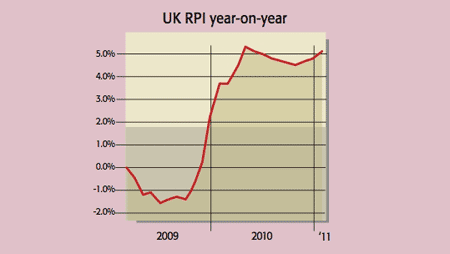
Inflation is on the march. Last week the UK’s Consumer Price Index (CPI) hit 4%, while the Retail Price Index, which includes housing costs, is now running at 4.8%. Bank of England Governor Mervyn King now admits that CPI could hit 4.4% before falling back (he hopes) in 2012. Fund managers are launching inflation-linked bond funds to entice investors worried about how to protect their capital. But are they a good idea?
Take M&G’s UK inflation-linked corporate bond fund. It aims to return more than CPI by investing in a range of high-yield corporate bonds and derivatives. But therein lies the problem. The search for a decent yield in the current climate demands just this sort of high-risk strategy. What’s more, the fund’s initial charge of 3% and annual charge of 1% will eat into returns.
Government bond funds offer a safer option. Vanguard’s UK Inflation-Linked Gilt Index tracks the relevant Barclays UK government bond index and also has much lower annual fees of 0.55%. But even this less-risky style of fund is far from perfect. All funds need to trade in and out of bonds on the open market. So they will be buying at higher prices and lower yields than are available on newly issued bonds. That will reduce potential returns, says Mathew Vincent in the FT. “A perfect hedge against inflation will only exist from issue date till maturity,” adds Willem Sels, UK head of investment strategy at HSBC Private Bank. “The day after issuance, the bond may already price a lot above par or below par.”
A key question is how sustained you believe the current bout of inflation will be. The market prices inflation expectations into inflation-linked bonds – this is called the ‘breakeven rate’. “The UK ten-year breakeven rate is 3.21% today. So, if you believe that inflation will be higher than 3.21% over the next ten years you should buy, otherwise you may be wasting your money,” notes Stuart Ratcliff of the Matrix Credit Opportunities Fund. With inflation only likely to rise, investors may still be tempted. However, given the charges and risks associated with bond funds, UK investors may be better off buying index-linked gilts directly. That way you get the benefit of a capital-gains-tax-free profit on sale (gilts are exempted from CGT) and avoid paying an annual management fee.